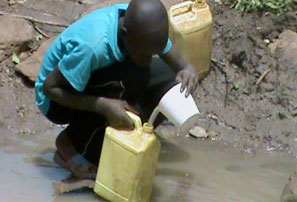
In Kenya, the fluctuation and inconsistence in the level and frequency of rain, soaring food prices, flooding and drought is wearing people down.
Credits: Caritas Kenya
By Samson Malesi Shivaji, National Livelihoods Coordinator, Caritas Kenya
Unusual rain, inconsistent water supply, high temperatures overall and extreme heat in some places, windy conditions, reduced farming outputs with greater costs, conflict and people forced from their homes.
In Kenya, the definition of climate change to the ordinary person in the village is devoid of scientific and technical parameters. Instead, the definition is the reality of everyday challenges that such an ordinary person has to live with from dawn to dusk.
The impact of climate change in Kenya hits hard on the resources of poor homes and they don’t have the capacity to combat its affects. The international debate on climate change does not resonate with the ordinary man or woman in Kenya. They are more concerned with how to cope with the challenges posed by the changes.
Food security is key to development. This is particularly important in Kenya, since the agricultural sector is the mainstay of the economy. Climate change is already affecting all four dimensions of food security: food availability; food accessibility; food utilization; food systems stability.
In Africa, climate change has already compromised the ability of many African societies to achieve the different Millennium Development Goals, the string of anti-poverty targets agreed by most governments. Climate change has the potential to further increase vulnerability of households by eroding resilience of individuals to managing their food resources. In Kenya, the fluctuation and inconsistence in the level and frequency of rain, soaring food prices, flooding and drought is wearing people down.
The Caritas Kenya model – dubbed the integrated food security approach – addresses immediate food availability needs while also strengthening the production systems and building resilience of communities against elements of harsh weather. This involves five main considerations; disaster risk management, environmental conservation, production of drought tolerant crops and post-harvest management.
In disaster risk management, Caritas forms disaster management committees at a community level , which take the lead in early warning and capacity building. We use existing indigenous knowledge in predicting and managing of the disasters.
A degraded environment unable to sustain a production cycle hurts farming. Caritas Kenya promotes environmental conservation initiatives integrated within the production process. The general rule is to promote soil and water conservation while also enhancing tree planting. Fruit tree planting has multiple benefits of soil conservation, shading and a wind break.
Caritas Kenya supports production of drought tolerant and drought resistant crops. They have a shorter than normal growing season or can withstand a harsher environment during the growing season. Communities have also adopted rearing drought resisting varieties of livestock, especially local breeds of goats and sheep. Such breeds are able to withstand the harsh environmental conditions and remain productive across the seasons.
It is important that food reserves be able to last for as long as possible. However, the changes in weather patterns have seen the emergence of new species of post harvest pests and more favourable conditions for the pests to thrive. Caritas promotes the use of cost effective storage of grains by the farmers. These include the metal silos, traditional grain storage huts and grain bulking.
Partnerships with local communities sees people taking the lead. Communities understand their local environment best and are able choose initiatives that allow for best adaptation to the hazards.
The government is responsible for social services and amenities to the general public. It is only the government that has nationwide network and capacity to deliver these services. Government also develops the frameworks on which other agencies base their plans. Partnership with government is therefore important for NGOs like Caritas. This means joint planning at national and provincial levels.
Caritas is also engaged in a number of partnerships with other NGOs, including being a member of the Kenya Food Security Steering Group (KFSSG), Kenya Climate Change Working Group (KCCWG) and Water, Environment and Sanitation Coordination (WESCOORD) meeting. Such partnerships are important for information collection, dissemination of findings and planning.
